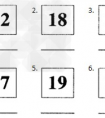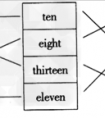把下列数字用英文表达。1. 10002. 2518 3. 56 4. 7200 5. 4011 6. 9300-五年级英语
2. 年代用定冠词及基数词表示的世纪加十位整数的复数形式构成
in the 1930/’s(in the thirties of the twentieth century或 in the nineteen thirties)
在二十世纪三十年代
in the 1860/’s(in the sixties of the 19th century或 in the eighteen sixties)
在十九世纪六十年代
In the 1870/’s when Marx was already in his fifties,he found it important to study the situation in Russia,so he began to learn Russian.
在十九世纪七十年代当马克思已经五十多岁时,他发现研究俄国的形势很重要,便开始学习俄语。
3. 表示某年代的早期、中期和晚期,可以在定冠词后,年代前添加 early,mid-,late
in the early 1920/’s 在二十世纪二十年代早期
in the mid-1950/’s 在二十世纪五十年代中期
4. 年月日表示法
A.年份用基数词表示,一般写为阿拉伯数字,读时可以以hundred为单位,也可以以世纪、年代为单位分别来读。
1949 读作 nineteen hundred and forty-nine 或 nineteen forty-nine
1800 读作 eighteen hundred
253 读作 two hundred and fifty-three或two fifty-three
1902 读作 nineteen hundred and two或 nineteen o two
表示在哪一年,一般在年数前加介词in,使用year时,year放在数词之前。
in the year two fifty-three B.C. 在公元前253年
但是,通常采用in加表示年份的阿拉伯数字。
B. 月份,在哪个月用介词in加第一个字母大写的月份词表示。
例如:in May在五月; in July在七月。
为了简便起见,月份与日期连用时,月份常用缩写形式表示。
缩写形式除May,June,July外,其它的月份都由其前三个字母表示,但September除外。
January——Jan.一月
February——Feb.二月
March——Mar. 三月
April——Apr.四月
August——Aug.八月
September——Sept.九月
October——Oct.十月
November——Nov.十一月
December——Dec.十二月
注:这里缩写形式后面加点不能省略,因为它是表示缩写形式的符号。
C.日期用定冠词the加序数词表示。在哪一天要添加介词on。
National Day is on Oct. 1.
国庆节是十月一日。(读作 October first)
此句也可以表示为 National Day is on the 1st of October.
May 5 五月五日(读作May fifth)
也可以表示为the fifth(5th)of May
Mar. 1(st) 三月一日(读作March first或 the first of March)
5. 表示不具体、不确切的时间,如世纪、年代、年份、月份时,用介词in表示;
表示具体确切的某一天用介词on表示通常情况下morning,afternoon,evening等词前用介词in。
但是,当这些词前后有一修饰限定的词作为定语,把它们限定为某一天早晨、下午或晚上时,介词in应改为on。
这里的修饰限定词可以是介词短语、名词、形容词、定语从句等。
On a cold morning,the old man died lonely in his house.
在一个寒冷的早晨,这个老人孤独地死在自己的房子里。
I don/’t want to be disturbed on nights when I have to study.
我不愿意在我必须学习的晚上被打扰。
The accident happened on the afternoon of July 7.
这次事故发生在7月7日下午。
We are to have a small test on Monday morning.
星期一早晨我们将进行一次小测验。
四、加减乘除表示法
1. “加”用plus,and或add表示;“等于”用is,make,equal等词表示。
2+3=? 可表示为: How much is two plus three?
2+3=5
Two plus three is five.
Two and three is equal to five.
Two and three make five.
Two added to three equals five.
If we add two to/and three, we get five.
二加三等于五
2. “减”用 minus或 take from表示
10-6=? How much is ten minus six?
10-6=4
Ten minus six is four.
Take six from ten and the remainder is four.
Six (taken) from ten is four.
十减去六等于四
3. “乘”用time(动词)或multiply表示
3×4=? How much is three times four?
3×4=12
Three times four is/are twelve.
Multiply three by four,we get twelve.
Three multiplied by four makes twelve.
三乘以四等于十二
4. “除”用divide的过去分词形式表示
16÷4=? How much is sixteen divided by four?
16÷4=4
Sixteen divided by four is four.
Sixteen divided by four equals/gives/makes four.
十六除以四等于四。
- 最新内容
- 相关内容
- 网友推荐
- 图文推荐
| [家长教育] 孩子为什么会和父母感情疏离? (2019-07-14) |
| [教师分享] 给远方姐姐的一封信 (2018-11-07) |
| [教师分享] 伸缩门 (2018-11-07) |
| [教师分享] 回家乡 (2018-11-07) |
| [教师分享] 是风味也是人间 (2018-11-07) |
| [教师分享] 一句格言的启示 (2018-11-07) |
| [教师分享] 无规矩不成方圆 (2018-11-07) |
| [教师分享] 第十届全国教育名家论坛有感(二) (2018-11-07) |
| [教师分享] 贪玩的小狗 (2018-11-07) |
| [教师分享] 未命名文章 (2018-11-07) |


![Hello! You can see ___________crayons. [ ]A. threeB. fourC. five-三年级英语](http://www.00-edu.com/d/file/ks/4/1/15/2019-08-13/small07da1502b58cf7152f184ff6e541c84b1565709386.jpg)



